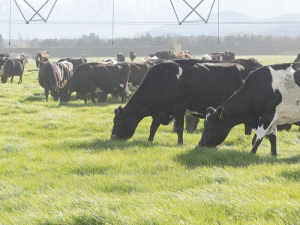'Altered'
OPINION: Dark suited spin doctors exist to, well, spin, and the nice cuddly progressive types at Greenpeace Aotearoa practice this dark art with the same cynicism as your average corporate giant.
 Some dairy farmers are supporting Greenpeace's campaign against further intensification of dairying.
Some dairy farmers are supporting Greenpeace's campaign against further intensification of dairying.
Greenpeace's sustainable agriculture campaigner Gen Toop says even dairy farmers are supporting their campaign against further intensification of dairying.
“Several dairy farmers have contacted us on social media and identified themselves as dairy farmers, and totally agree with our campaign,” said Toop. “We haven’t really had that before, in our work.”
Greenpeace in early May used aerial drone footage of the irrigation pipeline being built for the Simons Pass dairy conversion to launch a petition calling on the government to prohibit all new dairy conversions and further intensification of existing livestock farms.
Toop said the petition was one of their fastest-growing, recently passing 26,000 signatures.
“We are highlighting what’s happening there because obviously the Mackenzie is not cow country. It’s dry, its soils are leaky and its very ecologically sensitive.”
Although neither Greenpeace nor the EDS had been party to the Environment Court appeal giving the Simons Pass development the go-ahead, Greenpeace believes the fight isn’t over.
“Better late than never,” said Toop. “It’s every New Zealander’s right to stand up and try to stop intensive dairying from ruining the Mackenzie and polluting our rivers and lakes.”
Valentine’s claim that he would put only about 5000 dairy cows on the farm “has no standing” as long as the consent for effluent from 15,000 had not been terminated, she said. Nor did he yet have consents for all the planned dairy sheds.
Greenpeace would also oppose freeholding under tenure review, in the belief that without freehold the project would be financially unviable.
Castle Ridge Station has been named the Regional Supreme Winner at the Canterbury Ballance Farm Environment Awards.
The South Island Dairy Event has announced Jessica Findlay as the recipient of the BrightSIDE Scholarship Programme, recognising her commitment to furthering her education and future career in the New Zealand dairy industry.
New Zealand and Chile have signed a new arrangement designed to boost agricultural cooperation and drive sector success.
New DairyNZ research will help farmers mitigate the impacts of heat stress on herds in high-risk regions of the country.
Budou are being picked now in Bridge Pā, the most intense and exciting time of the year for the Greencollar team – and the harvest of the finest eating grapes is weeks earlier than expected.
The Real Estate Institute of New Zealand (REINZ) has released its latest rural property report, providing a detailed view of New Zealand’s rural real estate market for the 12 months ending December 2025.